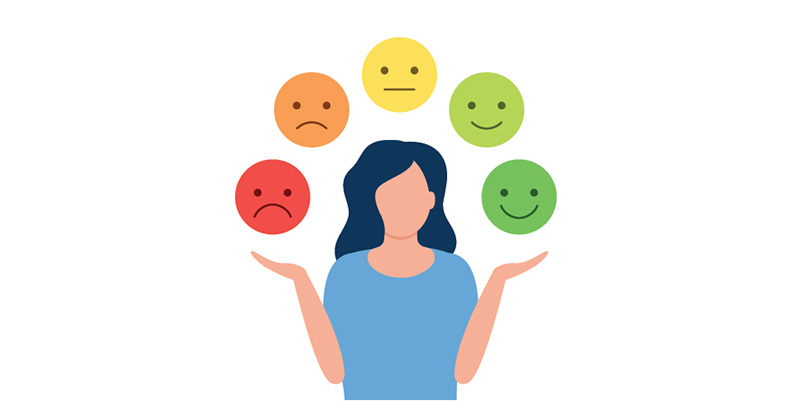
In September 2022, CPABC’s Mental Wellness Steering Committee conducted a second mental wellness survey to ask CPABC members and candidates1 if their mental health had improved, stayed consistent, or worsened over the past year. While the previous survey in 2021 provided an important baseline for the state of mental wellness in the profession and helped us identify if current support services were sufficient, the 2022 survey enabled us to understand how members and candidates were faring in the wake of COVID-19.
As in 2021, we compared the results with those of the Mental Health Index (MHI) survey, which is conducted by Telus Health (formerly LifeWorks), the provider of CPABC’s member assistance program for members, candidates, students, and their immediate family members. The MHI is a national survey from which we were also able to draw provincial data.2 What follows are some key takeaways and trends:
Overall psychological health
As noted in the May/June 2022 issue of the magazine,3 the committee’s definition of “mental wellness” is consistent with that of the World Health Organization, which defines mental health as “a state of well-being in which an individual realizes [their] own abilities, can cope with the normal stresses of life, can work productively and is able to make a contribution to [their] community.”4
Overall, the mental wellness scores of CPABC’s members and candidates in 2022 were similar to those recorded in 2021. Perceptions were generally mixed, with two-thirds of respondents stating that they were in good psychological health and felt optimistic about their future.
Interestingly, while CPABC respondents still had slightly lower MHI scores than the general populations of BC and Canada in 2022, the gap narrowed over the past year, indicating an overall improvement in mental wellness—although it’s worth noting that mental wellness scores for the Canadian population were still lower than pre-pandemic averages.
Lastly, members who were further along in their careers tended to score better across all measures of mental wellness, as was the case in 2021, and members and candidates living in the Lower Mainland had better mental wellness scores than their peers in other regions of BC.
Access mental health resources through Telus Health
All members, candidates, and students, along with their immediate family members, have access to confidential help through the Telus Health (formerly LifeWorks) Member Assistance Program. You can access the program by phone, web, or mobile app:
- Toll-free: 1-844-880-9142
- Web: login.lifeworks.com
- App: Download the free LifeWorks app on Android or iOS from Google Play or the App Store (username: bccpa; password: Lifeworks)
Ongoing stigmatization
Although there has been more open discussion about mental wellness in recent years, stigma persists. This was reflected in our 2022 survey results, with 30% of respondents saying they would find it difficult to acknowledge or accept a mental health issue and 40% saying they’d be concerned about career repercussions if they disclosed a mental health issue to their employer. These results were consistent with those from the previous year and comparable to those for the general populations of BC and Canada.
Reducing both the public stigma and the self-stigma associated with mental health issues in the workplace will require continued education and dialogue to encourage those struggling with mental wellness to seek the help they need.
Productivity and burnout
Most CPABC respondents (69%) said they were working more than 40 hours per week, likely a contributing stress factor. And when asked about productivity, 58% of respondents said they were physically or mentally exhausted by the end of their workday, which was higher than the previous year’s result of 51%. Similarly, the MHI survey found that Canadians in general were experiencing an increase in exhaustion, with respondents indicating higher levels of burnout across the board.
Compared to Canadians and British Columbians overall, CPABC respondents found it harder to get motivated to work in 2022 than before the pandemic, and this was consistent with the results of the 2021 survey.
Additionally, more than 25% of CPABC respondents said they’d experienced more mental stress than in the previous month; however, this measure actually improved between 2021 and 2022.
Career changes and shifting priorities
When asked if they were looking to make a career change, 30% of CPABC respondents said they were considering changing their job or career path, which was higher than the results for both the BC and Canadian populations. And of those respondents who said they were seeking a change, the most common reason cited was mental stress/strain at work.
The percentage of CPABC respondents who said they wanted to focus more energy on having fun/enjoying life than they did before the pandemic was slightly higher in 2022—62% compared to 59% in 2021.
Substance use
Consistent with our 2021 survey results, the 2022 results suggest that substance use was less of an issue for CPABC respondents over the past year than for the Canadian population as a whole, as our survey respondents reported lower rates of alcohol consumption and cannabis use than respondents to the MHI survey.
Access to mental wellness resources
In the 2022 survey, CPABC asked members and candidates about their access to mental health benefits through their employers, and 67% of respondents claimed to have access to mental wellness supports. Out of those who had access to benefits, 56% described these resources as “good” or “excellent.” Notably, however, 20% of survey respondents indicated that they had no mental health benefits, and a further 13% said they were unsure about the supports available to them at work.
Looking ahead
Given that there are some members, candidates, and students5 with no access to mental health benefits, CPABC will continue to increase the visibility and promotion of its mental wellness programs, which are available to members, candidates, students, and their immediate family members. In addition, we recognize that the organization has a role to play in raising awareness of and normalizing these issues within the profession.
However, reducing stigma is an issue that must be addressed profession-wide. All organizations that employ CPAs should be promoting mental wellness to support the well-being of their staff and reduce concerns about the potential for career-limiting repercussions. We encourage everyone to continue the conversation about this important topic.
About the respondents
- 62% of respondents were in the Mainland/Southwest region of the province, 23% were in the Vancouver Island/Coast region, and the remaining 15% were in other regions of BC.
- 51% of respondents worked in industry and 31% worked in public practice. The top four sectors in which respondents worked were finance/insurance; manufacturing; professional, scientific, and technical services; and education.
- The most common role respondents held within their organizations was “Accountant/Senior Accountant/Analyst” followed by “Controller/Comptroller/Chief Accountant.”
- 35% of respondents worked in larger organizations with 250+ employees.
- The vast majority of respondents were employed, with 85% working full time.
|
YEARS IN THE PROFESSION |
2022* |
|
CPA candidate |
21% |
|
5 years or less |
11% |
|
6 to 10 years |
12% |
|
11 to 15 years |
13% |
|
16 to 20 years |
10% |
|
More than 20 years |
31% |
|
Prefer not to say |
1% |
* Percentages do not sum to 100 due to rounding.
Jamie Midgley, FCPA,FCA, is the executive vice-president of regulation and registrar for CPABC and the chair of CPABC’s Mental Wellness Steering Committee. This article was originally published in the May/June 2023 issue of CPABC in Focus.
1 “Candidates” are students registered in the CPA Professional Education Program.
3 Jamie Midgley, FCPA, FCA, “Mental Wellness in the CPA Profession,” CPABC in Focus, May/June 2022 (26-28).
4\ World Health Organization, “Mental Health: Strengthening Our Response,” who.int, March 30, 2018.
5 “Students” refers to individuals enrolled in the CPA preparatory courses.



